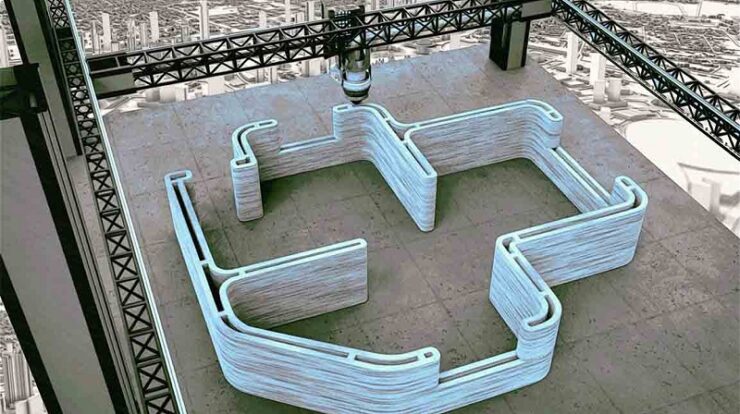
Leading the way in applying 3d printing in construction and structure is the Qatari capital, Dubai, a city that symbolizes the future of architecture. The emirate has a very lively Dubai 3d Printing Strategy aiming to make Dubai the worldwide 3D printing hub which proves its aim to emerge as an international 3D printing hub. This business has brought about a revolution within the layout and production of buildings and new traits and 3-d printing factories have arise.
Architects’ Education and Practice:
It has become apparent that architectural education and professional practice are now greatly dependent on Dubai 3D printing workshops. Forcing the user to apply new techniques on practically oriented examples, these workshops serve as innovative Petri dishes. The application of 3D in architectural design modelling and testing new shapes not easy to model using traditional techniques has become more common among working architects and architecture students.
These programs are not only enabling the architects to expand their database but are also instilling a different paradigm in their minds. Architecture is thus free to be more futuristic since ideas can be rather easily mocked up and tested. Modern architects can defy every protocol as well as the standards of beauty while designing buildings.
Also, several workshops applying 3D printing technology are filling the gap that is likely to be observed in the transition from the digital design stage to the practical application stage. These workshops are particularly beneficial in developing architects’ sense of connection to their work; their digital outputs and the built environment because they generate tangible outcomes immediately. A better concept of the architectural idea from the artistic point of view and the actual realities of construction limitations reaps out a refined and more intelligent idea.
Trends in 3D Printed Architecture that are on the Rise:
Because of the newest trend of using Dubai 3D printing trends technology adopted by the architectural field in Dubai, there are several marvellous shifts in the physical setting of the area.
Individualization and Intricacy:
The shift to highly customized and intricate architectural elements is one of the biggest trends. Customized components and complex shapes that would be too costly or impractical to make with conventional building techniques can now be created thanks to 3D printing capabilities. Buildings with distinctive features that are suited to certain settings, purposes, or aesthetic preferences can now be designed by architects thanks to this capacity.
Durable Building:
The architectural environment of Dubai is heavily focused on sustainability, and 3D printing is essential to this movement. As opposed to conventional building techniques, the technology permits exact material usage, greatly decreasing waste. Moreover, the space necessary for construction as well as environmental nuisances brought by construction projects can be reduced by the materials which are locally sourced and recycled by the help of 3D printing.
Construction and Rapid Prototyping:
Dubai’s development timeline is changing dramatically due to the speed at which 3D printing can create full-size building components and scale models. Faster design iterations and approvals are possible with rapid prototyping, and construction durations are being significantly reduced by on-site 3D printing of building components. Time is typically of the essence in development initiatives, thus this efficiency is especially valuable in a market as fast-paced as Dubai.
The incorporation of intelligent technologies:
Including smart technologies in building designs is becoming easier thanks to 3D printing. Architects are producing more environmentally and occupant-responsive buildings by directly integrating sensors and other technological elements into 3D printed constructions. Urban areas becoming more intelligent and adaptable are being created by this trend, which is in line with Dubai’s smart city objectives.
Architecture: Changing the Process of Design
Designing architecture in Dubai is changing dramatically as a result of the introduction of 3D architecture design and printing workshops and the ideas they have brought forth.
Working Together on Design:
It is self-evident that the incorporation of 3D printing in architectural design promotes more collaboration to be realized. The fast production of the physical models also benefit architects, clients, and other stakeholders with easier means of communication throughout the process of architecture. Increased cooperation is usually a factor that leads to better designs required by and to the expectation of all the stakeholders.
Optimizing and Designing Parametrically:
Using 3D printing and parametric design tools together is becoming more and more common among architects in Dubai. This combo makes it possible to experiment with different design iterations according to predetermined criteria, like structural effectiveness, environmental performance, or personal taste in aesthetics. More streamlined and effective architectural solutions are being produced by the speedy 3D printing of these iterations for assessment.
Subjective Originality:
Innovative materials for architecture are being developed in 3D printing workshops. Construction has never been easier because of experiments with a variety of printing materials, such as bio-based composites, sustainable concrete, and recycled plastics.
Dubai’s Architecture’s Prospects:
Dubai’s built environment is predicted to be significantly impacted by 3D printing technology as it develops and is more thoroughly incorporated into architectural practice.
Enormous 3D Printed Structures:
3D printing in architecture is mostly used for smaller-scale projects or parts of a building and structures; more and larger projects are being implemented. Future projects are fresher and bolder also and the first fully 3D printed office building in the world is in the city of Dubai. As the technology progresses both the large complex structures of major cities as well as the skyscrapers should opt for 3D printing.
Personalized Urban Environments:
3D printing is probably going to make whole cities more customizable than just individual buildings. Upcoming projects in Dubai might include landscape components, urban furniture, and even infrastructure that is 3D printed to fit the unique requirements and aesthetic of each community.
Conclusion:
Dubai’s architecture is changing significantly as a result of the incorporation of 3D printing workshops and the styles they are influencing. 3D printing is changing the approach to how individuals design and construct space from the pencil to the site, from constructs moving to the form, from toys to structures and may find even more innovative and sustainable design and construction solutions to emerge from this dynamic city as Dubai embraces this technology and advances it. Apart from reinventing the hitherto existing architectural know-how coupled with the contemporary 3D form of printing the architectural skyline of Dubai is being changed and the benchmarks of architectural innovative measures being set, internationally.
